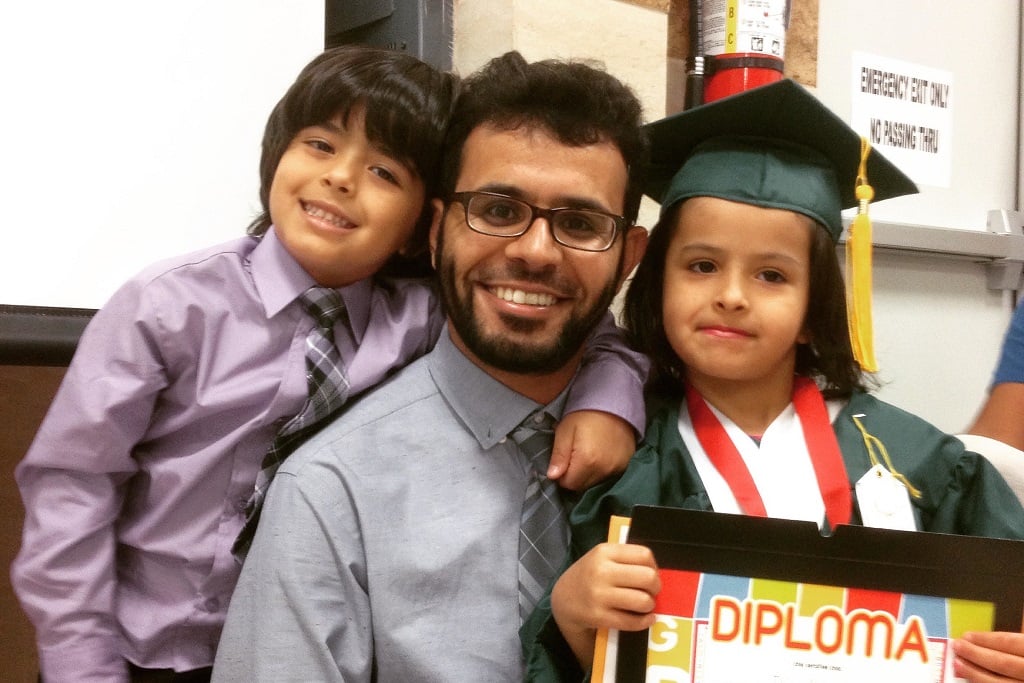According to US Census data, over 16 percent of Virginians now speak a language other than English in the home — including a growing number of Arabic families.
Nahlaa Alsilfih Alahmari and her husband, Abdullah Alahmari, are graduate students from Saudi Arabia. She is pursuing a doctorate in education at Virginia State University, and he is working toward a doctorate in media, art and text at Virginia Commonwealth University.
The couple is living in Richmond with their three children: a 9-year-old son, Muath, and daughters Ilan, 11, and Afnan, 4.
Though the family is thousands of miles from home, the Alahmaris want their children to stay connected to Saudi culture and especially the national language. So the parents speak Arabic to the children at home, and the youngsters take Arabic lessons at the Islamic Center of Richmond.
“Teaching my kids to speak in my maiden language is a very important thing to do. It is important to me as a mother and very important to the community as a whole,” Nahlaa Alahmari said. “It allows my children to feel more connected to their state of origin.”

The Alahmari family reflects the growing diversity of languages spoken in Virginia: The proportion of residents who speak a language other than English at home has risen from 14.8 percent in 2010 to 16.4 percent last year, according to new data from the U.S. Census Bureau.
Approximately 7.5 percent of Virginia households speak Spanish, the data showed. Then come Arabic, Chinese, Korean, and Vietnamese, each at slightly less than 1 percent. Dozens of other languages are spoken in the commonwealth as well — from Hindi and German to Telugu and Russian.
Arabic speakers represent one of the fastest-growing language groups in Virginia. Since 2010, the number of Arabic speakers in the commonwealth has risen 63 percent to almost 60,000, according to the Census Bureau’s American Community Survey.
Not surprisingly, the rise in Arabic speakers has paralleled the rise in the number of Virginians who trace their ancestry to the Arab world.
About 78,000 of Virginia’s 8.5 million residents claim Arab ancestry. That’s up 31 percent, from 59,000, in 2010.
Nationwide, the number of U.S. residents of Arab descent increased 28 percent — from about 1.65 million in 2010 to more than 2.1 million last year.
The states with the most Arab-ancestry residents are California (about 325,000), Michigan (200,000), New York (176,000), and Texas (157,000).

In most states, people with Arab heritage make up less than one-half of 1 percent of the population. The states with the highest concentrations of Arab-ancestry residents are:
- Michigan, at 2 percent of the population
- New Jersey and Massachusetts, at just above 1 percent
- Virginia and New York, at just below 1 percent
Within Virginia, Fairfax County has the highest concentration of Arab-heritage residents — 2.7 percent.
U.S. residents with Arab ancestry come from a range of countries. Lebanese is the most common nationality, followed by Egyptians and Syrians.
Studies show that migration from the Middle East and North Africa increased after the Arab Spring, the anti-government protests and uprisings that spread across much of the Islamic world in the early 2010s. That might explain the rise in the Arab population in the U.S. this decade.
Although Arab countries have their own cultures and traditions, one commonality is language. As people from those countries have immigrated to America, they have brought the language with them and sought to pass it along to their children.

Academic research has documented the benefits and challenges when people continue speaking their mother tongue abroad and teach it to their children.
For example, a study titled “Bilingual Children’s Mother Tongue: Why is it important for education?“ highlights how social, racial and cultural barriers can discourage people from learning their mother tongue and how parents can establish a strong language policy to avoid language loss.
Mohammed Albishri, a Ph.D. student at the University of Colorado at Denver, is a linguistic specialist. He said children who learn two languages end up speaking both better.
“For children who are already deep in the understanding of a different language, teaching them to speak in English can never have a negative impact on them,” Albishri said. “The understanding of a different language will further perfect the children’s understanding of English language. They will assimilate the language faster and better.”
About three-fourths of the Arabic speakers in Virginia say they speak English “very well,” according to the Census Bureau’s survey.
For children of immigrants, the problem often is not learning English — it’s learning the language of their home country. Nahlaa Alahmari said it can be a challenge to get her children to study Arabic.
“Sometimes,” she said, “my kids themselves resent practicing the language, as they say it is too difficult for them to comprehend — which, of course, it is reasonable, as no one else around them speaks the language.”
Written by Ezaddeen Almutairi, Capital News Service. Top Photo: Abdullah Alahmari and his son Muath, left, and daughter Ilan. (Courtesy of the Alahmari family)



